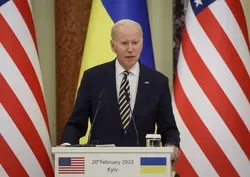
Norfolk Southern CEO defends Ohio derailment response
Clip: 2/21/2023 | 11m 43sVideo has Closed Captions
Norfolk Southern CEO defends Ohio response as EPA orders company to clean up toxic spill
The federal government ordered Norfolk Southern to clean up soil and water at its train derailment site in East Palestine, Ohio. Residents there say they're feeling the effects of air and water contamination. Geoff Bennett traveled to Ohio and questioned the rail company's CEO Alan Shaw about the long-term consequences of the derailment and chemical spill.
Problems with Closed Captions? Closed Captioning Feedback
Problems with Closed Captions? Closed Captioning Feedback
Major corporate funding for the PBS News Hour is provided by BDO, BNSF, Consumer Cellular, American Cruise Lines, and Raymond James. Funding for the PBS NewsHour Weekend is provided by...

Norfolk Southern CEO defends Ohio derailment response
Clip: 2/21/2023 | 11m 43sVideo has Closed Captions
The federal government ordered Norfolk Southern to clean up soil and water at its train derailment site in East Palestine, Ohio. Residents there say they're feeling the effects of air and water contamination. Geoff Bennett traveled to Ohio and questioned the rail company's CEO Alan Shaw about the long-term consequences of the derailment and chemical spill.
Problems with Closed Captions? Closed Captioning Feedback
How to Watch PBS News Hour
PBS News Hour is available to stream on pbs.org and the free PBS App, available on iPhone, Apple TV, Android TV, Android smartphones, Amazon Fire TV, Amazon Fire Tablet, Roku, Samsung Smart TV, and Vizio.
Providing Support for PBS.org
Learn Moreabout PBS online sponsorshipAMNA NAWAZ: We have two major stories this evening.
As the one-year anniversary of the war in Ukraine approaches, Presidents Biden and Putin deliver dueling speeches reflecting a sharp divide in the conflict, with no end in sight.
We will get to that shortly.
But we begin in Ohio.
The federal government today ordered the company Norfolk Southern to clean up contaminated soil and water at their train derailment site in East Palestine, Ohio.
The derailment more than two weeks ago led officials to carry out a so-called controlled release of toxic chemicals, forcing thousands to evacuate.
Since then, returning residents say they're feeling the effects of air and water contamination.
Geoff is in East Palestine, Ohio, tonight - - Geoff.
GEOFF BENNETT: Amna, Biden administration officials, plus the governors of Ohio and Pennsylvania, were on the ground today assuring residents here that everything is being done to clean up the area and hold Norfolk Southern, the train's operator, accountable.
MAN: Here's to you.
OK. GEOFF BENNETT: In his second trip to East Palestine in less than a week, EPA Administrator Michael Regan visited residents near the site of the derailment along the Ohio-Pennsylvania border, part of a push today by the Biden administration to ramp up the response to the disaster.
Regan was joined by Ohio Governor Mike DeWine, as they visited a health clinic that opened today to evaluate residents worried about symptoms from the chemicals released during and after the derailment.
The EPA today also took charge of the cleanup effort, ordering Norfolk Southern to pay for it, including houses and businesses near the crash site, the EPA citing a federal law which gives it the authority to force polluters to pay.
What exactly are you requiring them to do?
MICHAEL REGAN, Environmental Protection Agency Administrator: You know, we're requiring them to submit a very prescriptive work plan that lays out every single step that they plan to take to clean up the soil, any kind of water contamination, how they plan to transport that waste.
And we're going to force them to show went for community meetings and explain themselves to the community.
GEOFF BENNETT: The National Transportation Safety Board is still in the early stages of investigating the cause of the derailment.
But, today, Transportation Secretary Pete Buttigieg proposed a series of reforms to increase rail safety, including speeding up a 2029 deadline for stronger railcars, adding more personnel on trains and paid sick leave for crews, asking Congress for higher penalties for companies that break the rules, and revising regulations on train breaks and hazardous materials.
As the Biden administration is focused on reforms, for many in East Palestine, they're still racked with anger and fear.
BARB KUGLER, Resident of East Palestine, Ohio: I came outside, and I could see right away the main fire at the end of the street.
GEOFF BENNETT: Fifty-two-year-old Barb Kugler lives right next to the crash site.
After the derailment, she evacuated for nearly a week, but has now returned home.
She says she's nervous for this village in which she's lived for some 30 years.
BARB KUGLER: It breaks my heart to go down the road and to see people who rent homes and are moving out right -- right now.
And I just hate to see that happen.
But, no, I don't think it'll ever be the same.
I just -- I just don't.
GEOFF BENNETT: Over the weekend, volunteers handed out bottled water to anyone who asked.
While state officials have said the municipal water is safe, they urge those nearby the crash site who rely on private wells to drink bottled water.
Norfolk Southern is also cleaning up local waterways where the release of hazardous chemicals resulted in 3,500 dead fish.
As the cleanup continues, for some residents here, the worry is that the damage from exposure to toxic chemicals is already done; 71-year-old Daniel Clements lives about two miles from the derailment site.
DANIEL CLEMENTS, East Palestine, Ohio, Resident: These things are carcinogenic.
And that's the kind of damage where you're exposed, and something -- you may not notice anything for 5, 10, 15, even 20 years, and then, suddenly, you're really ill, and maybe even your last illness.
And that's worrisome.
It's terrifying.
GEOFF BENNETT: Clements says he's staying put for the time being and says Norfolk Southern needs to make it right.
DANIEL CLEMENTS: They have to fix this.
And some of the things that we need to do here, we can't fix ourselves.
I'm not capable of cleaning up toxins.
I'm not capable of reestablishing an economy.
I'm not capable of keeping businesses open.
I don't have those skills.
That's what the town needs.
GEOFF BENNETT: Residents here still have questions about whether the air and water are safe and about the company's commitment to address the long-term consequences of the derailment and spill.
Alan Shaw is the CEO of Norfolk Southern.
I spoke with him earlier today to get some answers.
Alan Shaw, thank you for speaking with us.
ALAN SHAW, President and CEO, Norfolk Southern: You're welcome.
GEOFF BENNETT: How long will Norfolk Southern maintain a presence in East Palestine?
ALAN SHAW: As long as it takes.
Yes, we're going to see this thing through.
That's my commitment to the community of East Palestine.
We're going to invest in the environmental cleanup.
We have made a lot of progress.
We have got air monitoring, water monitoring.
We're coordinating with the Ohio EPA.
We're continuing to provide financial assistance for the citizens of this community.
So far, we have either reimbursed or committed $6.5 million to the citizens of this community.
And that's a down payment.
And we're going to invest in this community for the long haul and help this community recover and help this community thrive.
GEOFF BENNETT: When you say the $6.5 million is a down payment, as you know, the average income for an East Palestine family is less than $45,000 a year.
We have talked to people who say they need Norfolk Southern to pay their medical expenses, to pay their moving expenses, and to pay for independent testing of wells and soil and air.
Is that something that you would commit to?
ALAN SHAW: We have stood up a lot of testing.
Within an hour of the derailment, we had air testing.
Within a couple hours of the derailment, we have had water testing.
There is independent testing going on right now with the Ohio EPA and with local health officials.
And there's been hundreds of tests, and there have been thousands of data points, and they have all come back with the same result that says the air and the water are clean.
And we're setting up long-term monitoring.
And we intend to be here for the long haul and continue to support this community.
GEOFF BENNETT: A question about rail safety, because, in November and December, Norfolk Southern met with federal regulators and pushed back against this proposed rule that would have, in most cases, mandated at least two crew members on trains.
Why did Norfolk Southern spend so much money, millions upon millions of dollars, lobbying against it?
ALAN SHAW: What we're really interested in is solution-based safety rules.
And we're very focused on following the science.
And with respect to this accident, the National Transportation Safety Board, as you know, they're in charge of this investigation.
And I'm very much looking forward to their results of their investigation.
Once we have that, we're going to sit down and we're going to figure out what we could have done better.
As you can imagine, every day since this occurred, I have been asking myself, what could we have done better?
What could we have done to prevent this?
So, we are fully cooperating with the NTSB and the FRA on finding out what happened here.
And we're going to make Norfolk Southern and the industry a safer railroad.
GEOFF BENNETT: Following this derailment, would Norfolk Southern support having more crew members on trains, not fewer?
This one had three crew members, an engineer, a conductor, a conductor trainee.
If there had only been one crew member on board, I'm told that, as bad as this was, it would have been even worse.
ALAN SHAW: I think it's really important that we let the NTSB continue with this process.
And there's a lot of speculation out there.
And in a very unusual moment, the chair of the NTSB, Chair Homendy, came out with a statement last Thursday urging everyone not to speculate on the cause of this or what could have mitigated it.
And so we're going to wait and see the results.
We trust the NTSB.
We trusted the FRA.
And I'm looking forward to sitting down with our regulators and our elected officials after - - after we get the results and working out solutions to make Norfolk Southern and the rail industry safer.
GEOFF BENNETT: What's your assessment of the latest rail safety rules proposed by Transportation Secretary Pete Buttigieg?
He's calling for safer tank standards, higher fines potentially for incidents like these.
ALAN SHAW: Yes, I have talked to Secretary Buttigieg about this a couple of times, as you can imagine.
And he's been very clear with me his frustration over this.
My commitment to Secretary Buttigieg is the same as my commitment to the citizens of this community.
We're going to continue with the environmental remediation.
We have got air monitoring, water monitoring set up.
We have long-term plans for monitoring.
GEOFF BENNETT: The rate of accidents on Norfolk Southern railways have increased in each of the last four years.
There was a derailment in Detroit just this past week.
At the same time, Norfolk Southern has seen record profits.
And so there's this question that the company is putting profits over safety.
Secretary Buttigieg had said much the same thing.
How do you respond to that?
ALAN SHAW: Safety is part of our culture, and it's clear that our safety culture and our investments in safety did not prevent this accident.
So we're going to take a look at what occurred here and see what we can do to make Norfolk Southern a safer railroad.
But we invest over a billion dollars a year in maintaining our network and equipment and in technology to make us safer.
GEOFF BENNETT: Over the past five years, Norfolk Southern paid shareholders nearly $18 billion through stock buybacks and dividends, twice as much as the railroad invested in operations and its own rail.
How do you account for that, making the case that the railroad is focused on safety, when you're spending twice as much money on shareholders?
ALAN SHAW: We're extremely focused on safety.
And over the long term, you have seen reductions in derailments and hazardous material releases and in injuries.
This is clearly a situation where our safety culture and our investments in safety did not prevent this accident.
And so I'm looking forward to seeing the results from the NTSB to see what we can do better.
GEOFF BENNETT: If you lived in East Palestine, would you feel comfortable moving back?
ALAN SHAW: Oh, absolutely.
I have been here several times, and I'm drinking the water.
And I have eaten the food as I have sat down with residents of the community and heard their concerns.
I know that the testing is showing that the air is safe and the water is safe.
I also know that this community is frustrated.
When I talk to the families here, they're scared.
There's a lot of misinformation out there.
They want to know that Norfolk Southern is going to be here for the long term, which we are.
GEOFF BENNETT: Norfolk Southern CEO Alan Shaw, thanks for your time.
ALAN SHAW: Thank you, Geoff.
Avian flu strain shows transmissibility among mammals
Video has Closed Captions
Clip: 2/21/2023 | 6m 7s | Avian flu strain raises concerns after outbreaks among mammals (6m 7s)
Case may roll back legal immunity for social media companies
Video has Closed Captions
Clip: 2/21/2023 | 7m 52s | Supreme Court case could roll back legal immunity for social media companies (7m 52s)
How Fort Wayne's investment in art mirrors its turnaround
Video has Closed Captions
Clip: 2/21/2023 | 8m 7s | How an Indiana city's investment in public art mirrors its overall turnaround (8m 7s)
Russia suspends participation in New START nuclear treaty
Video has Closed Captions
Clip: 2/21/2023 | 4m 12s | Russia suspends participation in nuclear treaty as Biden rallies support for Ukraine (4m 12s)
Where U.S.-Russia relations stand a year after invasion
Video has Closed Captions
Clip: 2/21/2023 | 8m 39s | Where relations between U.S. and Russia stand a year after Putin's invasion of Ukraine (8m 39s)
Providing Support for PBS.org
Learn Moreabout PBS online sponsorshipSupport for PBS provided by:
Major corporate funding for the PBS News Hour is provided by BDO, BNSF, Consumer Cellular, American Cruise Lines, and Raymond James. Funding for the PBS NewsHour Weekend is provided by...














